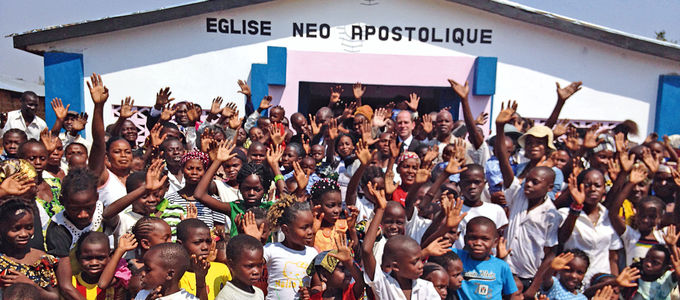
On 3 July, Chief Apostle Jean-Luc Schneider will conduct a divine service in the Democratic Republic of Congo. This is only three days after the country’s independence celebrations. As a former District Apostle of the country, the Chief Apostle is familiar with its turbulent history.
He called the landmass Congo Free State and seized it and all its inhabitants as his personal possession. Around 1884, the Belgian King Leopold II succeeded in making the landmass we today call Democratic Republic Congo (DR Congo) his private property, and all under the guise of humanity and science. His reign, however, was anything but humane. It became infamous for its brutality. In order to make it big in the rubber trade he exploited the land and its people.
On 30 June the DR Congo will celebrate its independence. In 1960 the country gained its independence from the Belgian colonial power. Even then, however, things did not really go all that well right away.
First contacts to Europe
The contact with Europe was quite promising. In the fifteenth century, Portuguese navigators came to the area and happened upon the Kingdom of Congo, one of the largest African states. From 1491 onwards, Portugal established diplomatic relations with the African kingdom and an almost equal relationship was established between the two countries. The missionaries were well received and King Nzinga a Nkuwa was baptised.
In 1876, however, King Leopold II convened an international geographic conference in Brussels to study the Congo—and further his interests—and founded what came to be known as the International Association of the Congo (AIC). While the AIC took control of more and more land in the Congo, King Leopold II gradually took over more and more shares from the AIC until he was its sole owner. Before long, the Congo Free State was his property.
Atrocities of a king
The atrocities that followed in the region cost the lives of almost half of the population until 1903. To make money from rubber, the people were forced to labour for the valued resource. Punishment and malnutrition took their toll. Many died of exhaustion or as a consequence of rape and mutilation, others were executed for the slightest infraction.
When the atrocities in the Congo became public knowledge, there was an international outcry that led to a human rights movement. King Leopold II was forced to cede his country to the Belgian state. The country remained a colony of Belgium, and the people of what was now called Belgian Congo continued to suffer from exploitation by the colonial power.
Independent, but poor
As in many colonised countries, the Belgian Congo made efforts to break away and make itself independent. Aber rebellions in the capital of Léopoldville (modern Kinshasa), Belgium suddenly withdrew from the country, leaving chaos in its wake. In 1965, Mobuto Sese Seko seized power, subjecting the people to a brutal dictatorship that lasted 32 years.
The end of the dictatorship marked the beginning of the genocide in Rwanda. In 1994, many of the perpetrators fled to the DR Congo, from where they planned and carried out further attacks in Rwanda. This was also the start of the first two Congo wars, which only ended in 2003.
The entire economy, as well as the social systems of the country now called the Democratic Republic of Congo, had collapsed. An estimated three million people had been killed. The first freely elected president since 1965 did not have an easy time of it: there was hardly any infrastructure and the country’s eastern region, with its rich concentration of precious metals and minerals, was constantly being looted, leading to the Third Congo War. It ended only in 2013.
Even today, the DR Congo is one of the poorest countries on earth. Although it is one of Africa’s richest countries in terms of mineral wealth, it suffers from decades of exploitation, corruption, many years of war, and a constantly growing population.
Excitement over a special visitor
Shortly after Independence, Day Chief Apostle Jean-Luc Schneider will conduct the divine service for the departed in the city of Goma. This is where the largest refugee camp for people fleeing the carnage in Rwanda was located and from where the extremists were organising attacks.
The Chief Apostle knows the Congo’s history well. When he was still District Apostle of France, he was responsible for the south-eastern part of the DR Congo, which today is led by District Apostle Tshitshi Tshisekedi. Together with the Regional Church DR Congo West, under District Apostle Michael Deppner, the DRC has 3.27 million New Apostolic Christians. This represents more than a third of all New Apostolic Christians in the world. During his pastoral trip to the DRC, the Chief Apostle will conduct two divine services in the country’s capital of Kinshasa. If he wanted to pay a visit to all the congregations in Kinshasa, he would have to extend his stay considerably: there are 1,700 congregations in Kinshasa!




